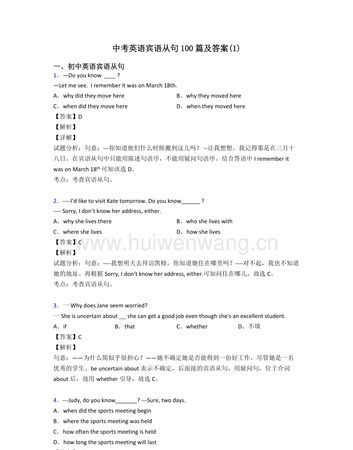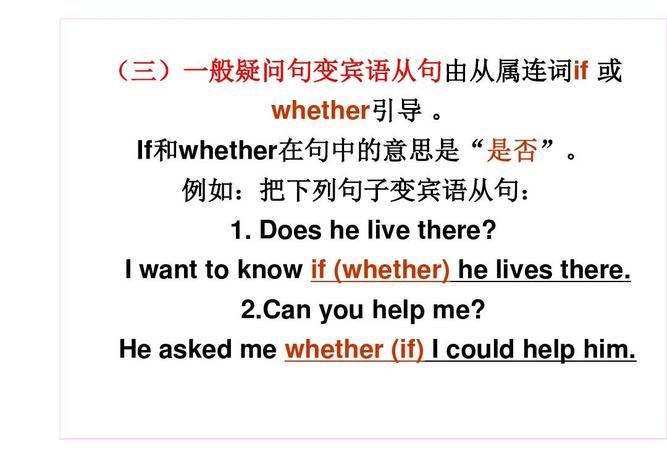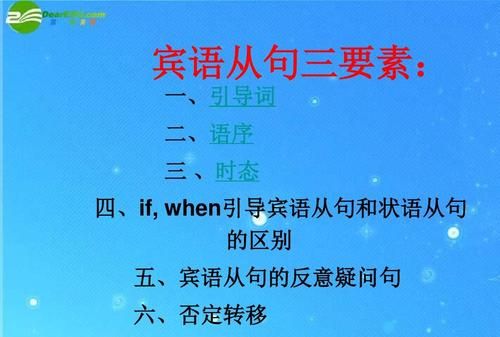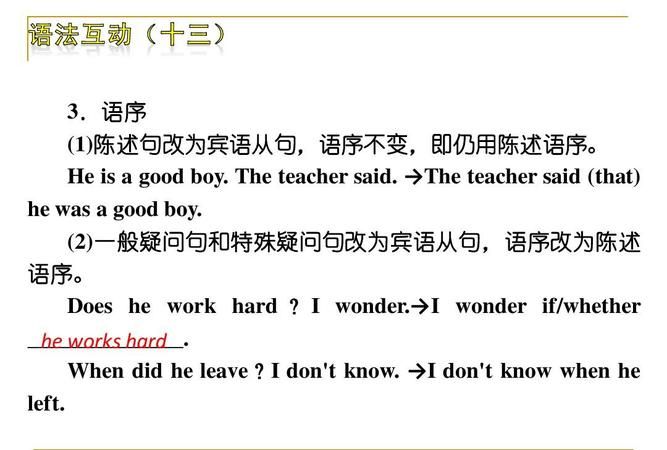本文目录
定语从句中还有一个定语从句
题目:English Study
内容: We all know that learning (非谓语动词作主语) English is very important (宾语从句),but not everyone can learn it well.
To learn English well, (不定式做目的状语),first, we should have the believe that we can make it. (同位语从句)。 If we are confident enough, then nothing is impossible. Second, we need a Grammar book which is written by well-known experts. (定语从句) and a good dictionary. Last but not least, we should find more chances to communicate with your English teachers or native English speakers. It is only by practising more that we can learn English well. (强调)
所有种类的从句都叫复合句。

初三下英语宾语从句思维导图
P.c:这是我在网页上搜的,你看看吧。The Attributive Clause (定语从句)
I.在复合句中修饰名词或代词的从句叫做定语从句。被定语从句修饰的名词或代词叫做先行词。定语从句必须放在先行词之后。定语从句需由关系代词或关系副词引导。
II.引导定语从句的关系代词:who, whom, whose, which, that
关系副词:when, where, why
III. 关系代词和关系副词的作用:
(1):桥梁作用:把先行词和定语从句联系起来。
(2):代替先行词在定语从句中充当句子成分。
*关系代词在定语从句中可以做主语、宾语、定语。
*关系副词在定语从句中可以做状语。
IV.关系代词和关系副词的用法:
1. who指人,在定语从句中做主语。
The boy who is playing football is my son.
I do not like the students who often watch TV.
2. whom指人,在定语从句中做宾语。
The woman whom you met at the gate is my wife.
Pan Changjiang is an actor whom many girls love crazily.
3. whose指人或物,在定语从句中做定语
The boy whose mother is a doctor often falls ill.
Peter enjoys reading books whose covers are yellow.
4. which指物,在定语从句中做主语、宾语。
A plane is a machine which can fly in the sky.
A flying cock is a cock which is flying now.
Here is the letter which your boyfriend wrote.
5. that 多指人,有时也指物,在定语从句中做主语、宾语。
Examples of No. 1, 2, 4 & 5 can all be replaced by THAT clauses.
In the following conditions, we must be careful with the use of “that”.
Which, whom 在定语从句中做介词宾语, 这样的介词可以放在whom, which 之前, 也可以放在从句的原来的位置上。但是当介词被放在定语从句之前时, 则只能用whom, which. 不能用that.
Tom is the man from whom I learnt the news.
This is the house in which Lu Xun once lived.
Here is the question about which we have had so much discussion.
6. that 和 whom/that 的区别:在下列情况下必须用that:
(1). 先行词为all, little, much, everything, nothing, something, anything;everyone, no one, someone, anyone; everybody, nobody, somebody, anybody时。
Anyone that listen to him is a fool.
Is there anything that I can do for you?
Everything that we saw was of great interest to us.
(2). 先行词被all, every, very, no, some, any, little, much, only修饰时。
Mi Mi has enjoys all the songs that are sung by Chen Long.
You are the very girl that I have been looking for.
Rose is the only flower that I really like.
(3). 先行词被序数词修饰时。
The first thing that you should do is to study hard.
The last place that we visited was a farm.
(4). 先行词被adj最高级修饰时。
This is one of the most exciting football games that I have ever seen.
(5).当有两个或两个以上的先行词后(既有人又有物)。
He talked about the teachers and schools that they had visited.
当先行词被the same, such修饰时, 关系代词往往用as。
Such people as you describe are welcome.
This is the same coat as he bought yesterday.
7. when指时间,在定语从句作时间状语。
= in/at/on which
October 1st, 1949 was the day when the People’s Republic of china was founded.
Ge You and Zhao Benshan were born on a day when it thundered and rained.
I’ll never forget the day when I graduated from Beijing Normal University.
8. where指地点,在定语从句作地点状语。
=in/at/on which
The college where I’ll study is very good.
This is the house where Li Lisha was born.
9. why指原因,在定语从句作原因状语。
= for which
The reason why I send flowers to you everyday is a secret.
That is the reason why I did it.
比较:
The poor village that/which we visited 10 years ago has taken on a new look.
The days that/which we spent together made me happy.
V. 限定性定语从句和非限定性定语从句。
**限定性定语从句是句中不可缺少的组成部分,如果没有定语从句, 先行词的意思就不明确, 主句也不完整,从句和主句一般不用逗号隔开。
** 非限定性定语从句是主句先行词的补充说明,没有定语从句并不影响主句意思的明确或完整。这种定语从句一般用逗号与主句分开。在非限定性定语从句中通常不用关系代词“that”.
Last week Tom went to the beach, where he met Li Li 5 years ago.
Yesterday I bought a T-shirt, which only cost me 18 yuan.

带有宾语从句的英语作文
I do not even know how to answer your question, which is not quite clear.

以let's do sports为题写一篇英语作文
In my life, sports play an important role. I am really fascinated in swimming. I first learnt to swim when I was 7 years old. I fell in love with the
sport on the very first day. It becomes a part of my life now.
Every weekend, I go to the stadium near my home. I swim twice a
week. I was quite weak before I started to swim. Swimming makes me
healthy and now I go to hospital much less than before. I got
plenty of benefits from swimming. In fact, learning isn’t an easy
thing. But no pains, no gains. The hard work I had paid was worth
because I gained a lot. In my opinion, sports are really important.
They enable me to live healthily and happily.

以上就是关于中考英语作文宾语从句 ,定语从句中还有一个定语从句的全部内容,以及中考英语作文宾语从句 的相关内容,希望能够帮到您。

